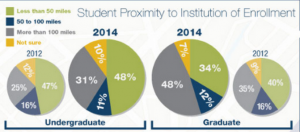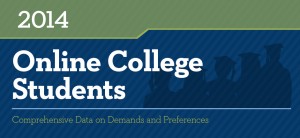Transfer Credit Policy, Job Placement Key to Online Students, Distance From Institution Matters Less
/A national study of students pursuing on-line degrees found that cost and financial aid are important, but not critical in the decision-making process for those considering an on-line program of study. In addition, the data indicates that job placement messaging resonates, and transfer credit policy makes a difference in attracting online students.
The “Online College Students 2014: Comprehensive Data on Demands and Preferences” report, is a joint project of Learning House and Aslanian Market Research, a division of EducationDynamics. The standard benefits of an online program, such as convenience and flexibility, are no longer enough for colleges and universities to differentiate themselves, according to the study. Instead, students are looking for value, both in earning their degree and in how the degree will help their career. Among the key findings:
- Although students reported that cost was a primary selection factor when choosing an online degree program, approximately two-thirds of respondents said they did not choose the most inexpensive program. Only 20% said they would not attend an institution if financial aid was not offered, although approximately half said they would need financial aid.
- When given a choice of 18 marketing messages, the overwhelming favorite was “90% job placement.” The top-ranked marketing message categories were: Career Opportunities (28%), Personalization (19%), Speed to degree (17%), Scholarships/Promotions (17%), Quality/Reputation (11%), and Student Support (8%).
- Approximately 80% of students have earned credit elsewhere, and those students want to bring that credit with them. Having a clearly defined, generous, and easy-to-navigate transfer credit policy can help institutions stand apart.

Overall, the study found that 54 percent of students attend an institution within 100 miles of where they live, showing a three-year trend of students increasingly willing to attend an institution farther from home. (In 2012, 80% reported attending an institution within 100 miles of where they lived. This declined to 69% in 2013.)
The number of individuals working full time declined from 60% in 2012 to 46% in 2014, while the number of those who are unemployed rose from 16% to 30% over the three past consecutive studies.
“For institutions looking to expand their online footprint, it’s critical to communicate the right message to students,” said Dr. David Clinefelter, Chief Academic Officer at Learning House and coauthor of the report. “Colleges and universities need to not only think about what sets their institutions apart, but also track student outcomes to provide quantifiable data about the value of their degrees.”
In Connecticut, Charter Oak State College's degree completion programs enable adults, who already possess college credits or work experience, to complete the Associate or Bachelor's (Baccalaureate) degree that meets their needs. Connecticut's public online college has been ranked number one in affordability among online degree programs in-state by AffordableCollegesOnline.org (AC Online). The College offers a number of workforce relevant programs for adults who want to advance their careers, change careers, return to work, or validate their training and educational experiences. Majors that can be completed using Charter Oak courses exclusively include Cyber Security, Health Care Administration and Health Information Management.
According to the National Center for Education Statistics, in 2012 approximately 2.6 million students were enrolled in fully-online degree programs, while 5.5 million were taking at least one online course.






























